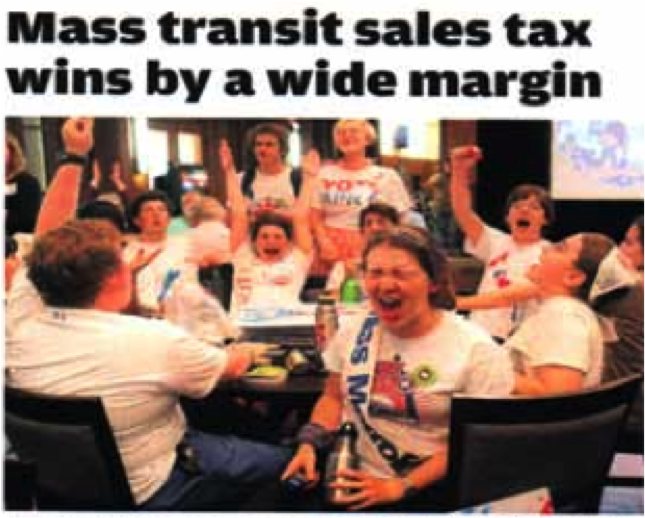At the local level, business has been a key force in cementing transit victories. But at a national level, the business voice has been largely absent from heated, high-stakes debates about transit. With a new report called “Bosses For Buses,” Good Jobs First investigates the disparity between local- and national-level organizing efforts by employers.
In the past few years, there have been three serious threats to federal support for transit, and at no time did the business community step forward to make its voice heard.
“There’s this kind of schizoid situation where, outside the beltway, we see very strong support for transit among employers and riders and lots of other people and more than 70 percent of state and local ballot initiatives consistently winning, year in and year out,” report co-author Greg LeRoy told reporters yesterday. “But on the Hill, here inside the beltway, for three different episodes, we see a very fractured corporate voice on transit and less positive outcomes.”
Those three episodes were: the Republican proposal to cut federal funding for transit during the last surface transportation reauthorization; the expiration of parity between commuter benefits for transit and for parking; and the elimination of operations support for transit systems from early drafts of the American Recovery and Reinvestment Act by then-White House Economic Council Director Lawrence Summers.
“None of those episodes drew a unified corporate voice for transit,” LeRoy said. “Nor was there any kind of unified national corporate outcry in the Dark Years -- ‘08, ‘09, ‘10, and ‘11 -- when about 85 percent of transit systems in the United States cut service, raised fares, and abandoned routes in the worst episode for transit service in United States post-war history.”
Sure, transit manufacturers and suppliers are part of the American Public Transportation Association, so they get heard that way. But those companies are far outnumbered by those with a simpler interest in transit: to get their employees to work. Though these businesses have shied away from the rough-and-tumble national dramas, they have long been major players in local campaigns for transit funding, helping win 72 percent of local ballot measures for transit since 2000 and countless other victories.
Good Jobs First highlights some inspiring examples. Washington University in St. Louis was one of the most impressive, having co-founded its local Citizens for Modern Transit in 1985. And the university practiced what it preached:
The University was also an early leader for sustainability in the region. When the University wanted to add additional classroom and office space, zoning regulations required additional parking also be built. The University considered that both expensive and not environmentally friendly, so it pushed for the light rail system as a way to avoid expanding its parking areas.
The university also fought hard for a half-cent sales tax hike for transit in 2010, even as other businesses -- chastened by a defeat two years earlier -- sat on the sidelines. University Chancellor Mark Wrighton co-chaired a 40-member steering committee for Prop A and sent a letter to local alumni and faculty urging them to support it. Between fundraising and in-kind contributions, the university donated $168,500 to the campaign -- about 16 percent of its total budget. Students mobilized to get out the vote, and the measure was approved by a wide margin.
The university offers free transit passes to its 12,000 employees and 13,000 students, and has negotiated an agreement with Metro to provide transit connections among the school’s five campuses and other destinations.
In Cleveland, the HealthLine BRT route owes its existence (and its name) to the Cleveland Clinic and University Hospitals of Cleveland, which recognized transit as part of their mission to provide access to health care -- even after some initial resistance to restrictions on automobiles. And in Los Angeles, the local chamber of commerce helped pass Measure R, the ground-breaking half-cent sales tax referendum to fund several major transit improvements.
The list goes on. Meanwhile, there have been some efforts to unite pro-transit employers on the national stage, like Best Workplaces for Commuters, a DOT/EPA program that’s become an academic, not governmental, initiative out of the University of South Florida’s National Center for Transit Research. But corporate support for public transportation remains fragmented.
While at a local level, firms are willing to stand up and talk about how they rely on transit to access a larger pool of potential employees -- especially “creative class” professionals who embrace car-free city living -- they haven’t done so nationally. And while the U.S. Chamber of Commerce has worked tirelessly in support of infrastructure investment, the body doesn’t give a strong focus to transit. “I’m not sure the Chamber is the best horse to ride,” LeRoy said.
Will corporate employers stand up for the transit systems they depend on when the next reauthorization is negotiated? We’ll find out soon -- MAP-21 expires in 16 months, and that’s just barely enough time to hammer out a bold new vision for surface transportation policy.






